There are a few different ways macarons are made. French macarons are considered easier to make while Swiss and Italian macarons are considered more challenging but are more structurally sound.
French macarons also require less equipment. While I love Italian macarons, I like to keep things simple and usually stick with the French method.
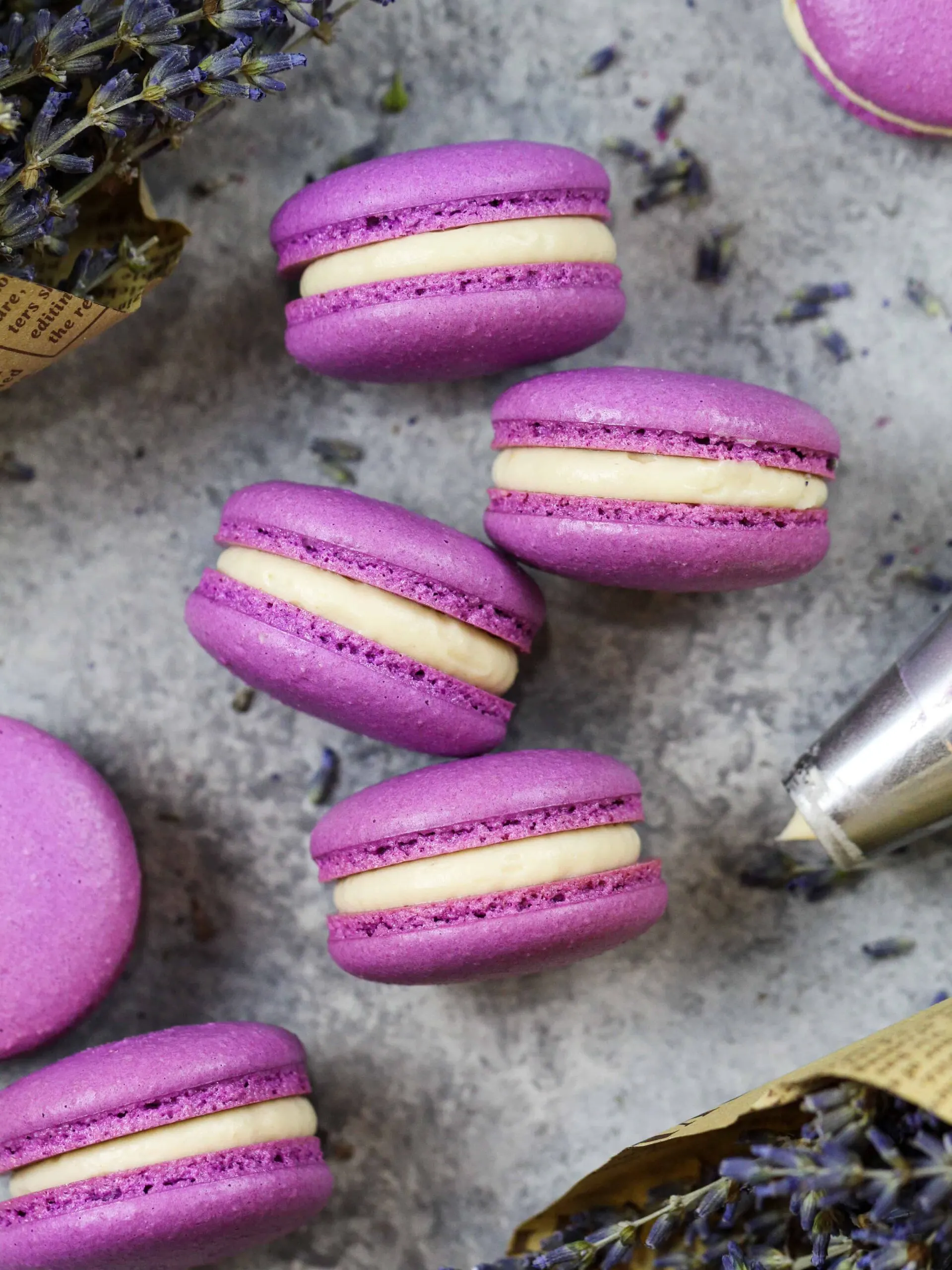
The French Method vs. the Italian Method
The French method whisks egg whites together with a bit of sugar to create a French meringue with stiff peaks.
This meringue is then folded with a mixture of super fine almond powder and powdered sugar.
This process of folding the meringue and the dry ingredients together is called macaronage.
There are two significant ways the Italian method differs from the French method.
The first difference is that the Italian method whisks egg whites with a hot sugar syrup to create a stiff meringue.
This step can be a bit tricky to get just right and it makes Italian macarons harder to make in my opinion.
The second difference is that super fine almond flour and powdered sugar are mixed with raw egg whites to form a paste before any meringue is folded into them.
Both methods require expertise to mix the batter the perfect amount to achieve that elusive, lava-like consistency that leads to perfect macarons.
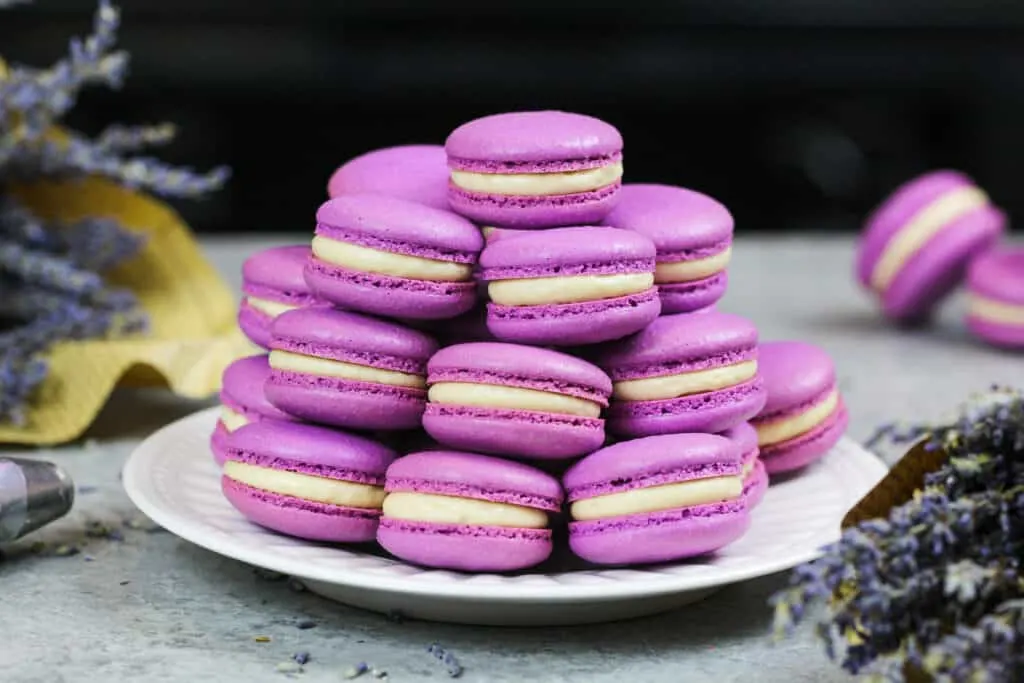
Equipment You’ll Need to Make French Macarons
Like I mentioned above, French macarons don’t require a ton of equipment!
However, I find they turn out best when the ingredients are weighed, and the macarons are baked on a silpat mat.
As macarons bake, they usually spread less on silpat mats than parchment paper.
There are the tools I like to use when I make French macarons:
- Kitchen scale
- Stand Mixer or Electric Mixer
- Large piping bag
- Round piping tip
- Large, flat baking sheets
- Silpat Mats (or parchment paper)
Making French Macarons: Step-by-Step Process
While the recipe below is quite detailed, I find visual cues to be super helpful!
Below are some photos and a video tutorial of the process to help guide you through this recipe.
Step #1: Prep Your Ingredients and Equipment
After weighing your ingredients, wipe down your mixing bowl and whisk attachment with a bit of vinegar or lemon juice.
This removes any residual grease and helps the meringue whip up better!
Step #2: Sift the Dry Ingredients
Sifting your superfine almond flour and powdered sugar will help your macaron shells turn out nice and smooth.
This step makes sure that no chunks of almond or powdered sugar get mixed into your macaron batter.
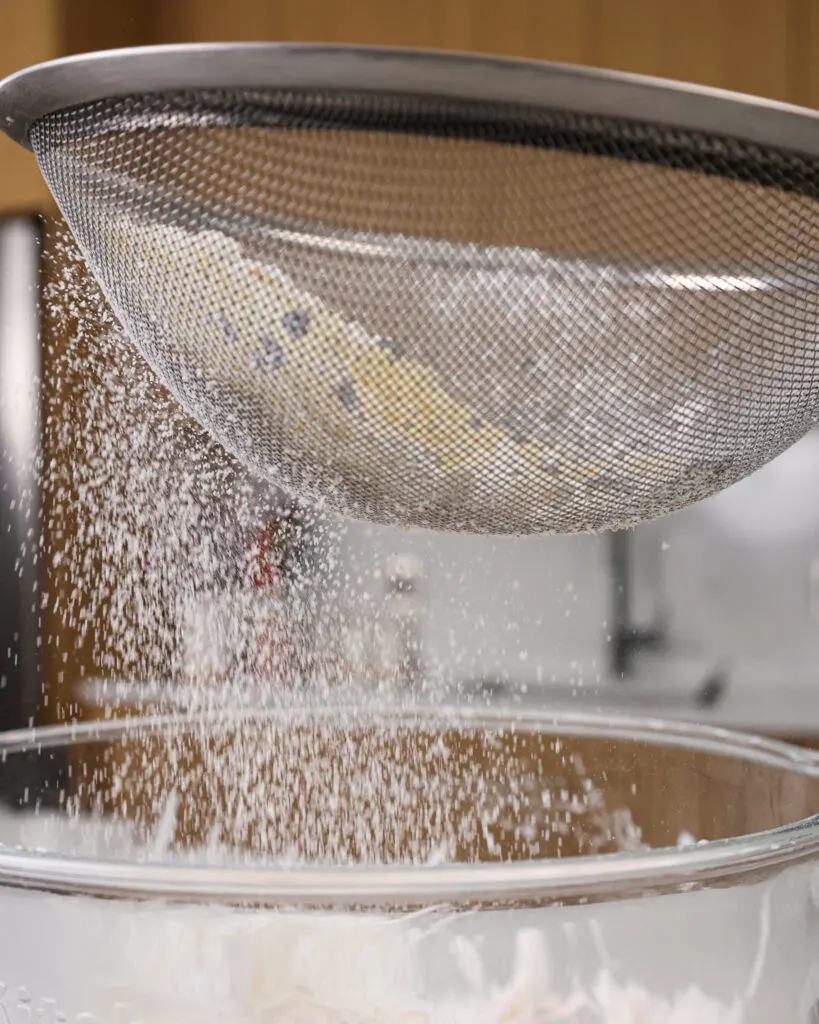
Step #3: Make French Meringue
Next, it’s time to make the French meringue!
Whisk the egg whites on a medium speed until soft peaks form, then add in the granulated sugar.
Once the sugar is incorporated, add in gel food coloring if desired.
Increase the speed to medium-high and mix until stiff peaks form like in the photo below.
Keep a close eye on your mixer to avoid over mixing the meringue.
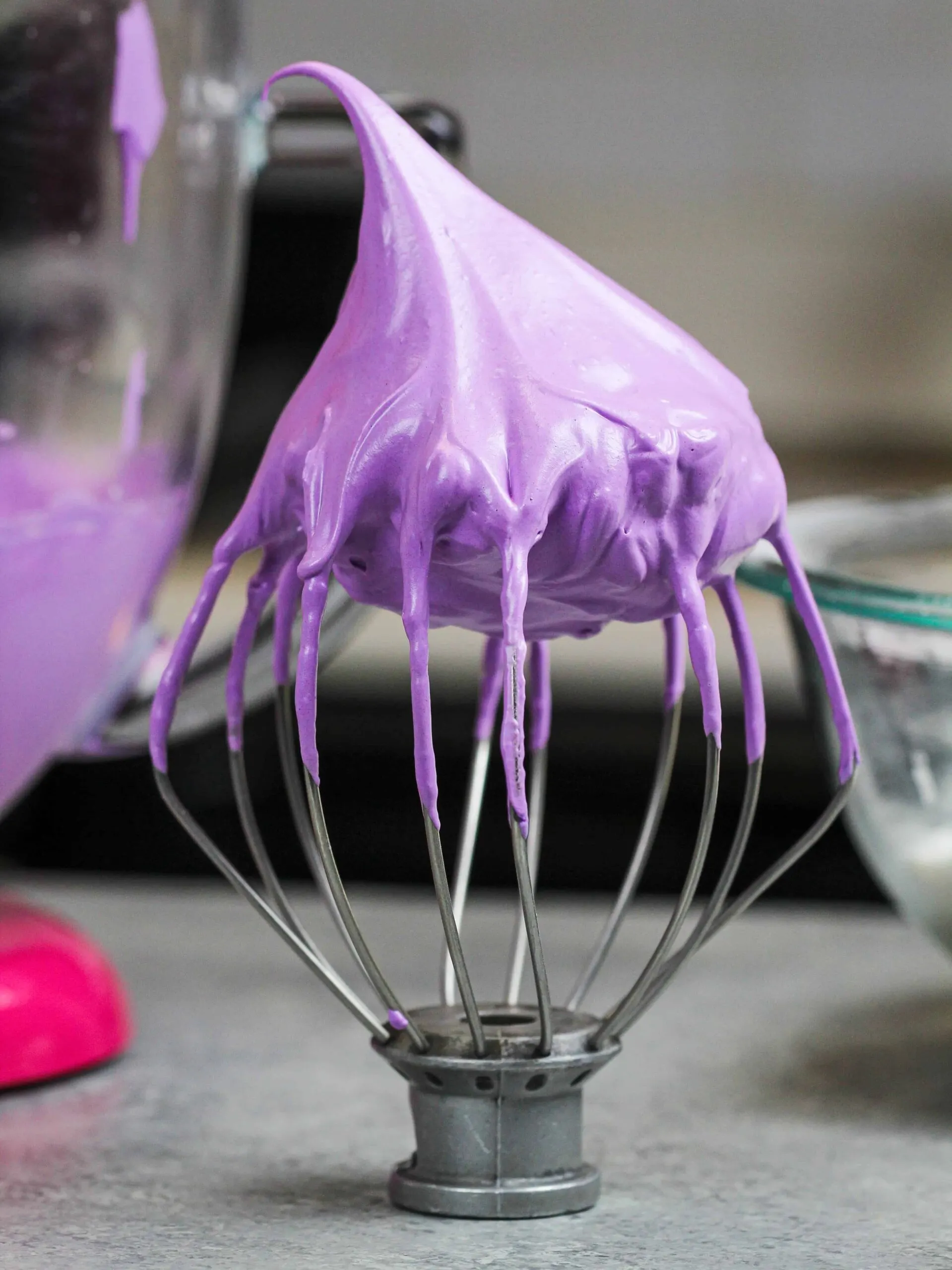
Step #4: Mix the Dry Ingredients into the Meringue
Fold the dry ingredients into the meringue in two additions. Continue to fold the batter until you achieve a lava-like consistency.
The batter should form a thick ribbon that flows off your spatula when it’s lifted like in the photo below.
Another way to test your batter is the figure 8 test. Try to create a figure 8 using the flowing batter. If you’re able to create one your batter is ready to go.
If the stream of batter breaks before you’re able to, you may need to stir it a bit more.
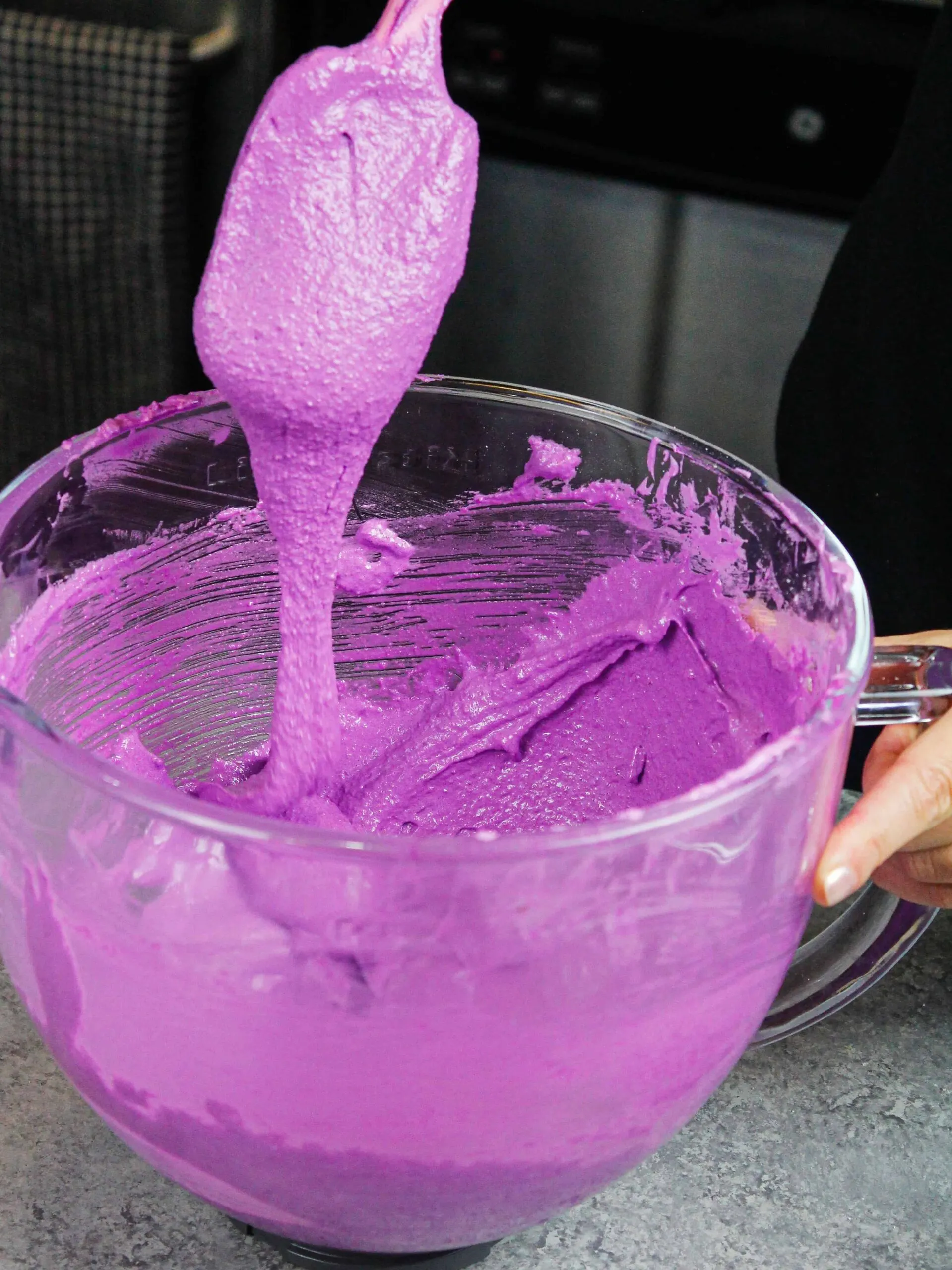
Step #5: Pipe the Macaron Shells
Fill a large piping bag with macaron batter and pipe 1 1/2-inch rounds onto the prepared baking sheets. Space them about 1 inch apart.
Firmly bang or drop your pans on the counter a few times.
This brings any trapped air bubbles to the surface, which can be popped with a toothpick or scribe.
This can help you avoid hollow or cracked shells.
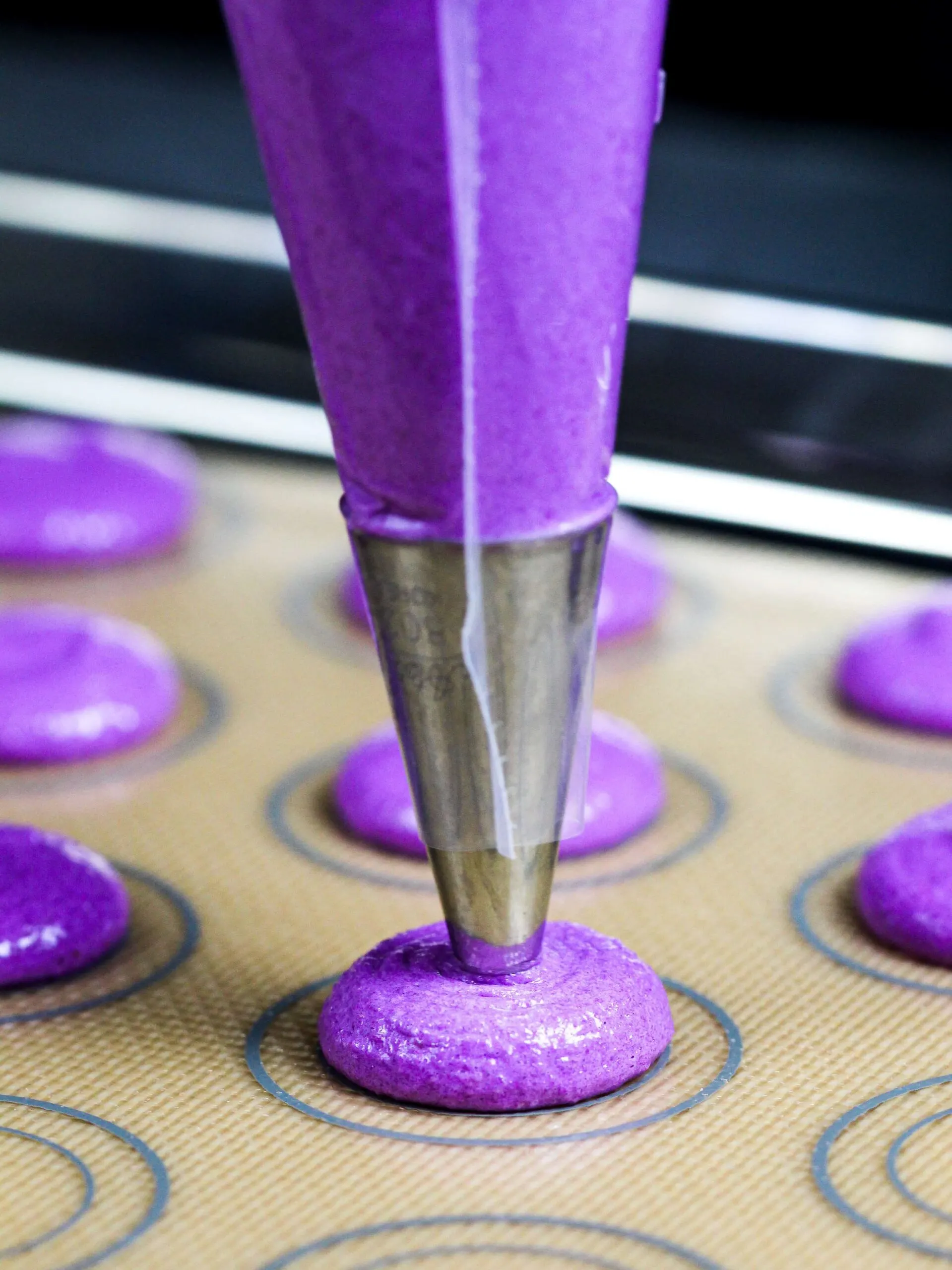
Step #6: Rest Your Piped Macarons
Let the macarons rest for about 30 minutes, or until they form a skin.
They should be mostly dry to the touch and look matte once they’re ready to be baked! While the shells rest, preheat your oven.
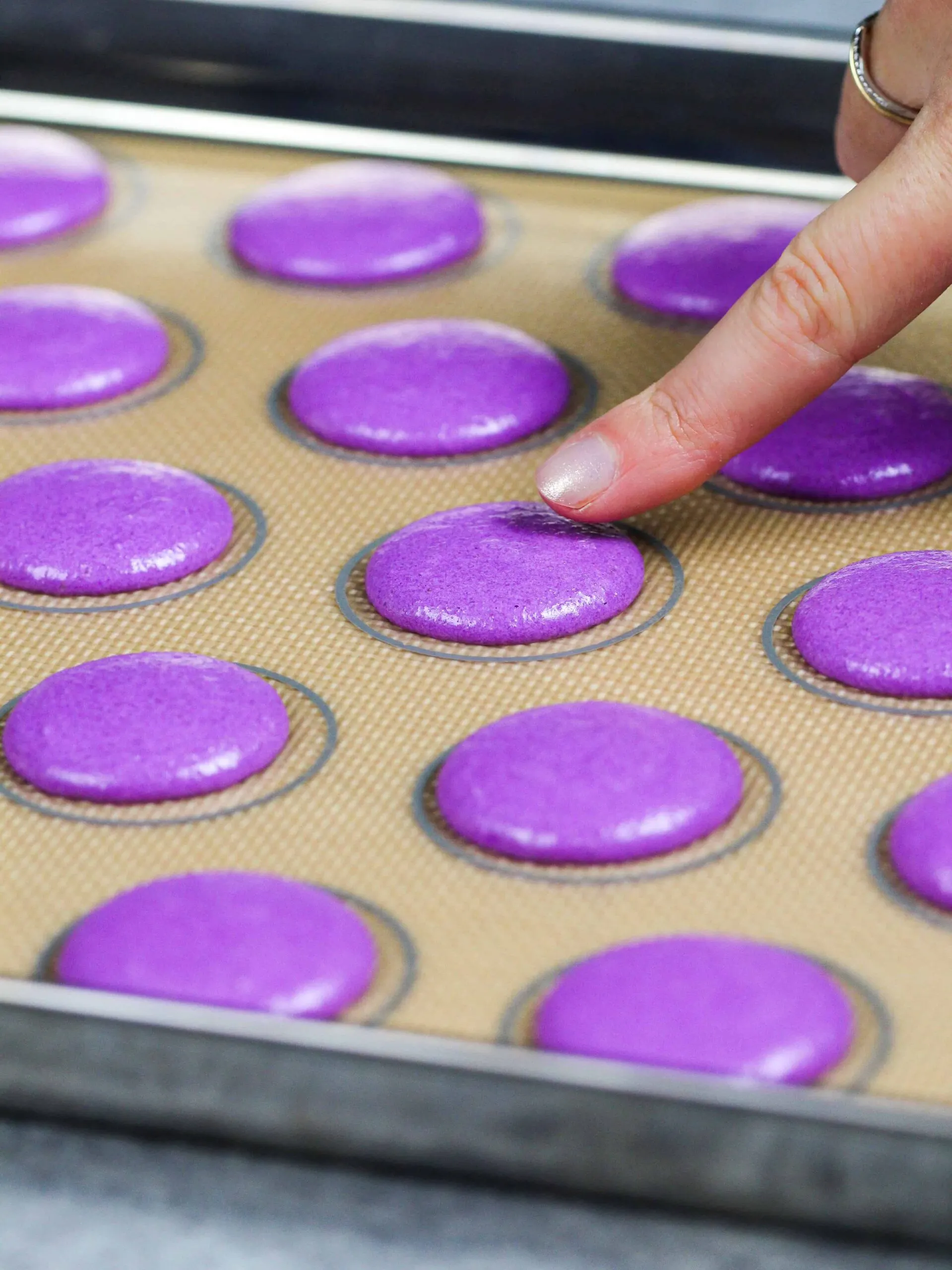
Step #7: Bake Your Macarons
Bake one tray of macarons at a time and place the tray in the middle rack of your oven.
Let the macarons cool fully on the pan then gently remove them from the silpat mat.
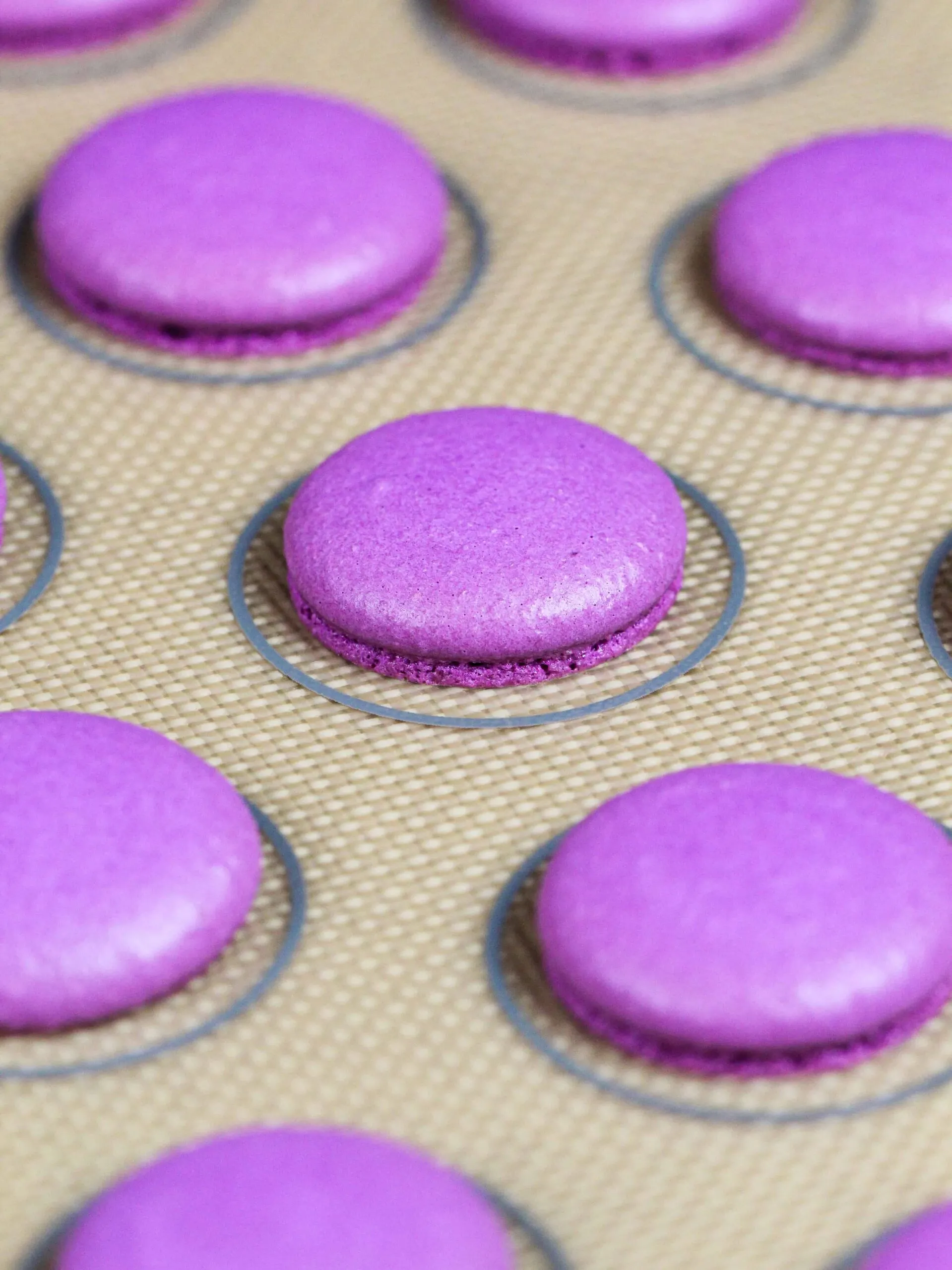
Step #8: Assemble the Macarons
Pipe a small dollop of a filling of your choice on one macaron shell and top it with a second shell.
I love to use my vanilla buttercream recipe, but any type of frosting or ganache will work.
Place the finished macarons in an airtight container and store them in the fridge to mature overnight.
Letting them rest overnight while they are filled softens them (in a good way) and allows the flavors to develop.
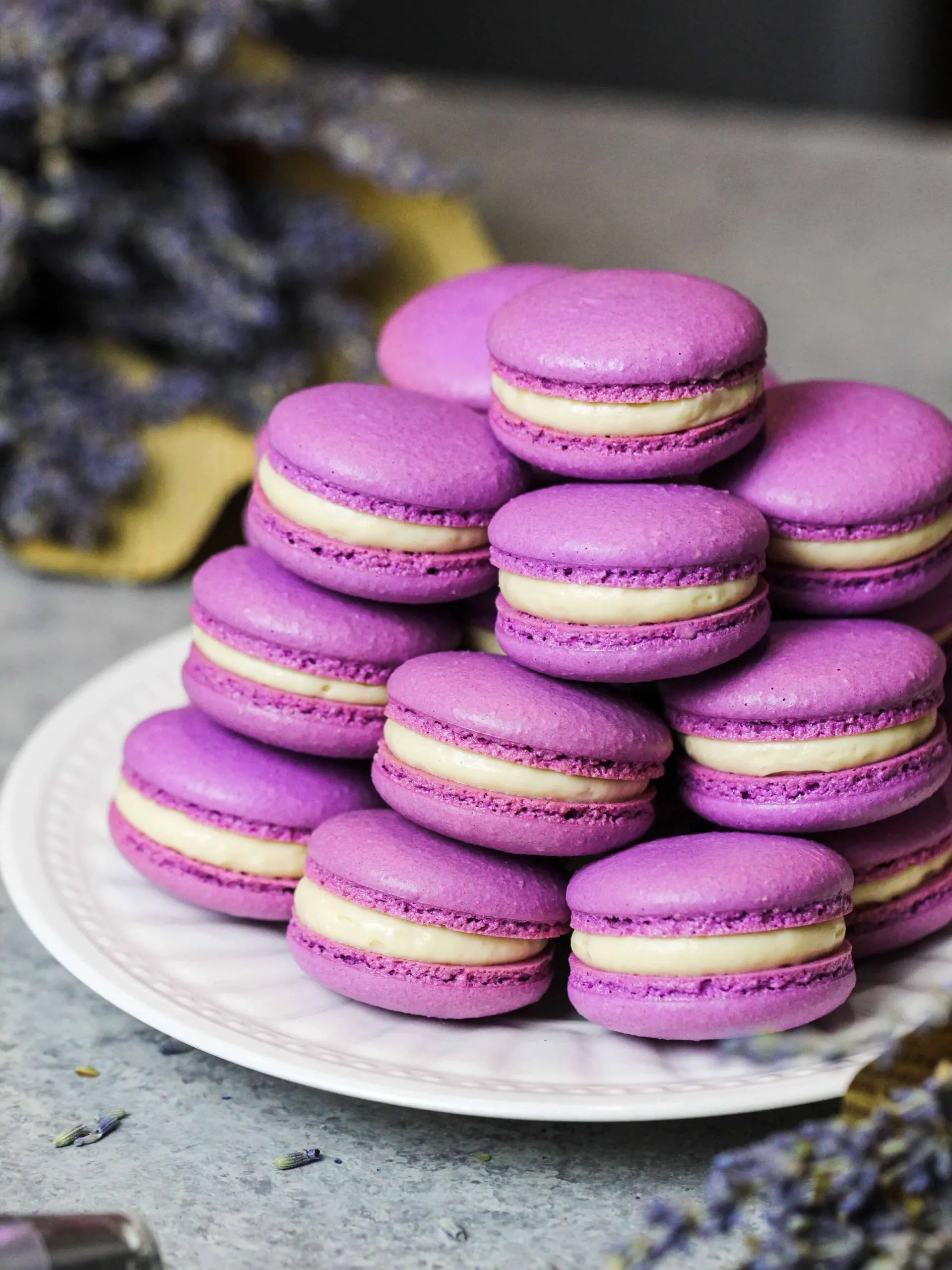
Troubleshooting French Macarons
While I’d love to think everyone’s first batch of French macarons will turn out perfectly, my own experience has taught me that’s not how things usually go.
Macarons are incredibly temperamental, and it might take a few tries to get them just right.
Below are some of the issues I’ve run into when baking macarons.
I also share ways to prevent them from happening again.
Why Do My Macarons Have Cracked Shells?
Cracked shells were the first issue I ran into when I started baking macarons.
A few different things can cause cracked shells, including too short of a rest, trapped air bubbles, too hot of an oven, or undermixed batter.
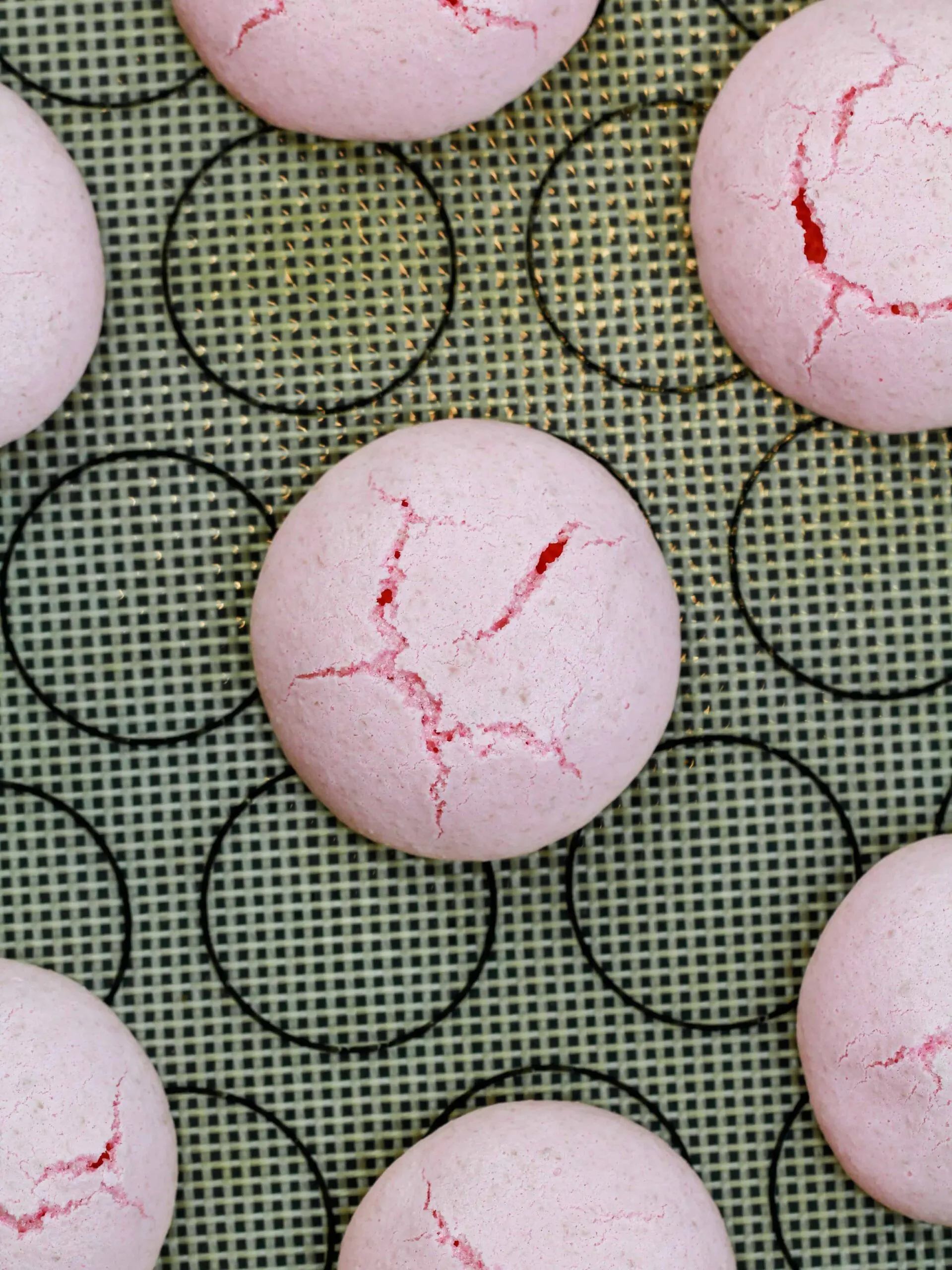
Potential Fixes: Bang your pans firmly before resting your macarons, rest your macarons until they form a skin, check your oven for hot spots, or mix your batter slightly more.
Why Are My Macarons Hollow?
Hollow macarons have big air pockets between the top of the shell and the base of each cookie.
This can happen when the meringue or batter is over-mixed or if air bubbles get trapped before the shells are baked.
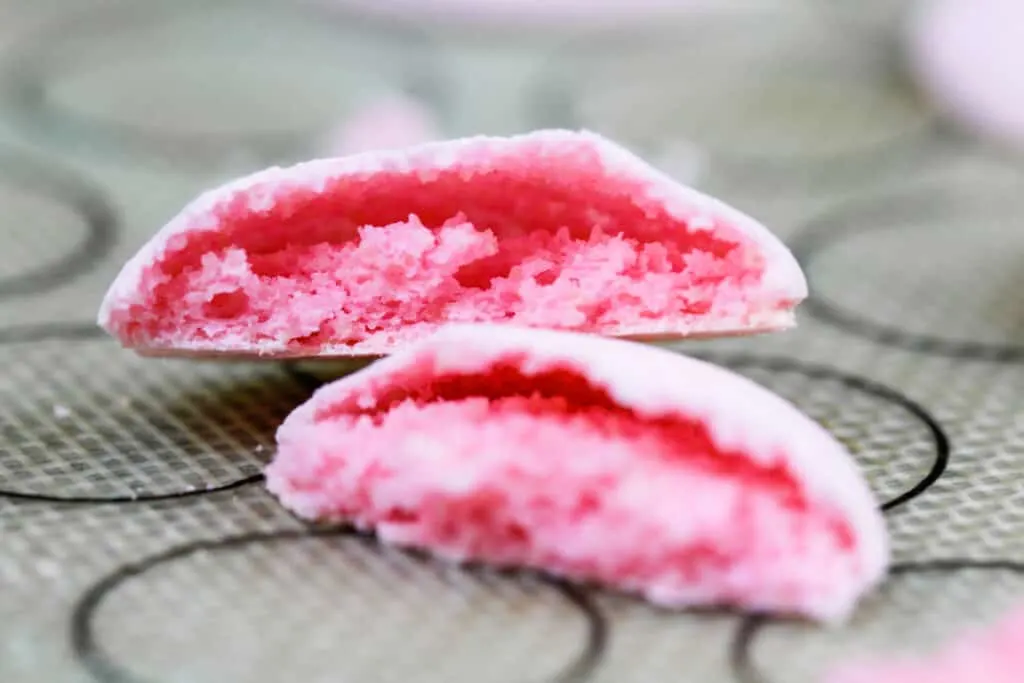
Potential Fixes: Make sure you’re not over-mixing your meringue/batter or bang your pans firmly against your counter before letting them rest.
Why Are My Macarons Sticking to My Baking Sheet?
Your macarons may stick to your mat/parchment paper if they’re underbaked, or if you didn’t let them cool fully before trying to remove them.
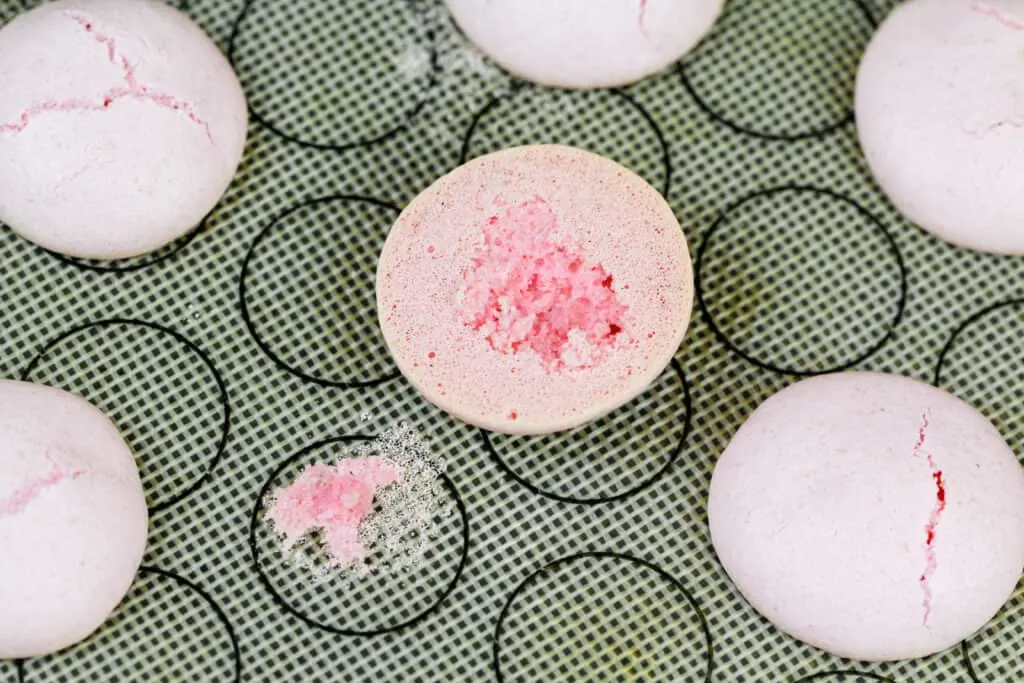
Potential Fixes: Let your macarons cool fully before trying to lift them or bake them slightly longer.
Why Don’t My Macarons Have Feet?
If your macarons don’t develop feet, it could be because your batter is too wet, your batter was over-mixed or you didn’t let your macarons rest for long enough.
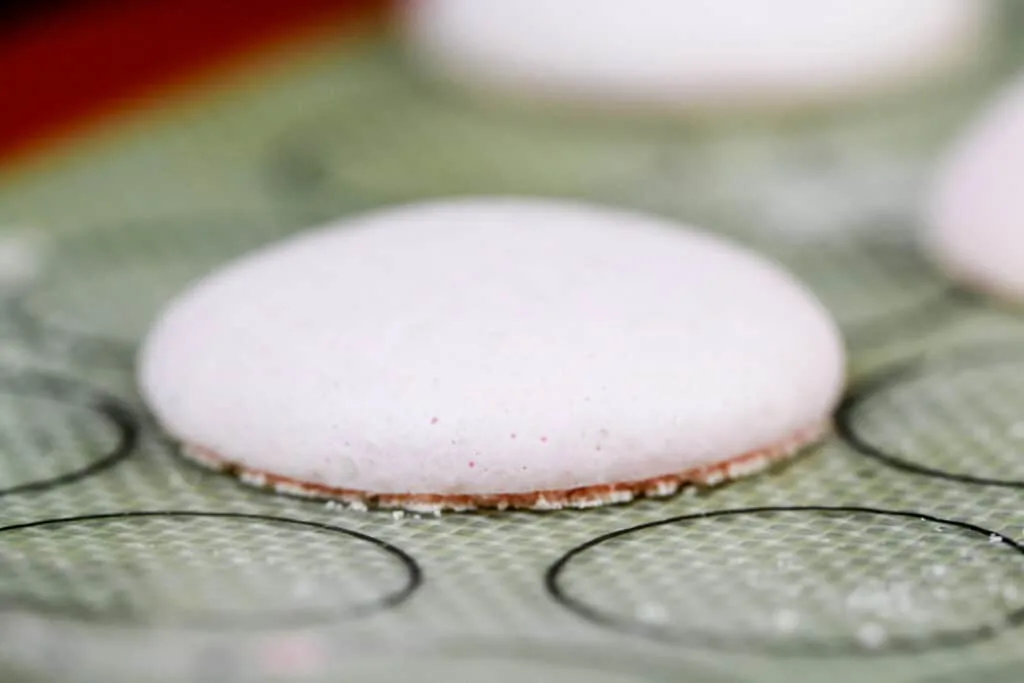
Potential Fixes: Try using aged egg whites, make sure you’re not using any liquid flavoring or food coloring, or let you shells rest until they form a touchable skin (20-40 minutes).
Why Are My Macarons Crispy/Hard?
Sometimes if your batter is over-mixed it causes your shells to spread more and bake up crispy.
They may also just be over-baked!
Keep in mind that macaron shells soften once they’re filled and have time to mature in the fridge, so don’t be disheartened if they seem a bit firm once they’ve cooled.
Potential Fixes: Mix your batter less, bake your macarons for less time, brush the bottoms with milk, or fill them and see if the maturation process softens them.
Why Are My Macaron Shells Brown?
There’s nothing worse than baking up tray of macaron shells only to see they’ve browned!
This is caused by over-baking or hot spots in your oven.
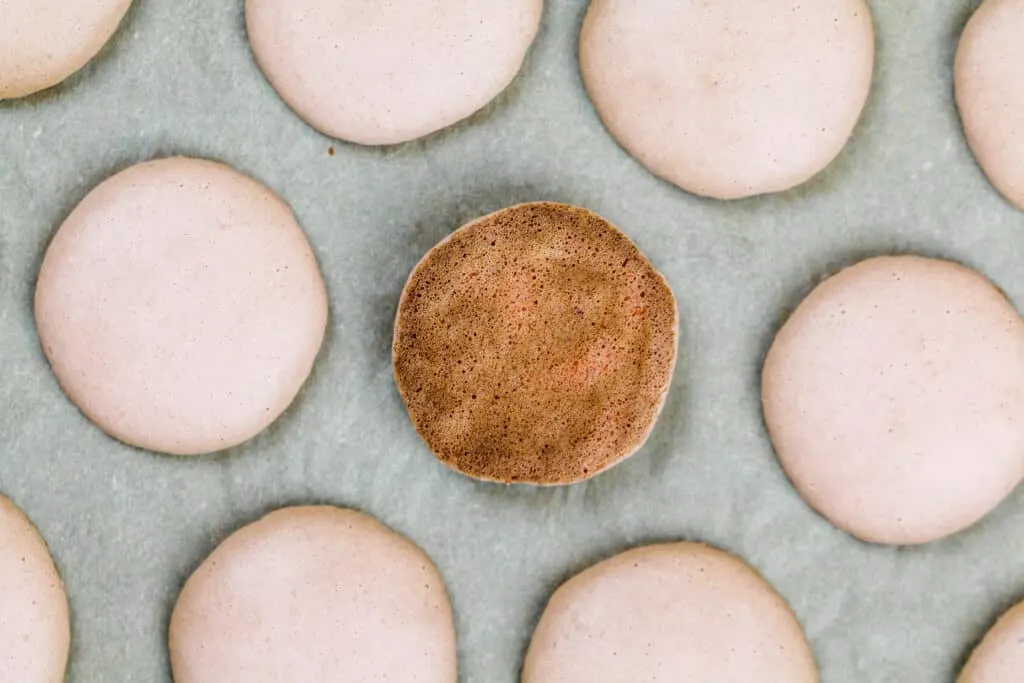
Potential Fixes: Turn down your oven temp by 5-10 degrees F, bake them for slightly less long, bake the macarons with a pan above them to protect them from the heat, or bake the macarons with two pans.
Why Are My Macarons Uneven?
This can be caused by an uneven baking tray or mat, an oven that bakes unevenly, or from uneven piping.
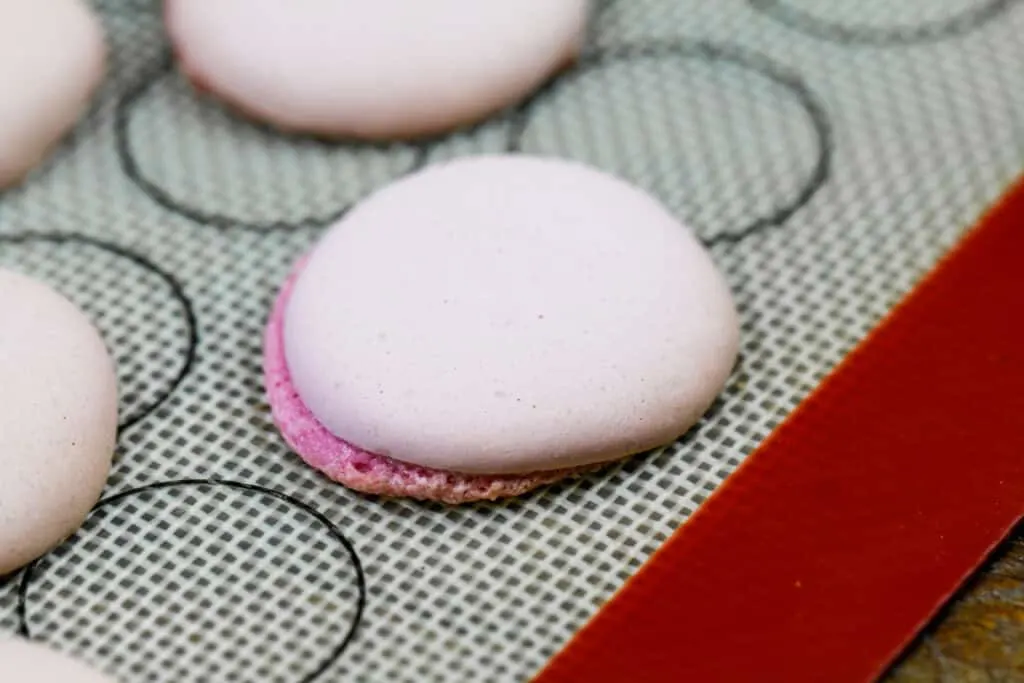
Potential Fixes: Make sure you’re using a good quality pan and silpat mat, test your oven for hot spots, make sure you aren’t baking convection, or take your time when piping and use a template to ensure your macarons are consistent in size and shape.
Choosing the Right Filling for Your French Macarons
While we put tons of energy into the shell of a macaron, almost all the flavor in a macaron comes from its filling.
The shell gives macarons an incredible texture, but the filling is what determines its flavor.
You can use just about any type of frosting or ganache to fill macarons.
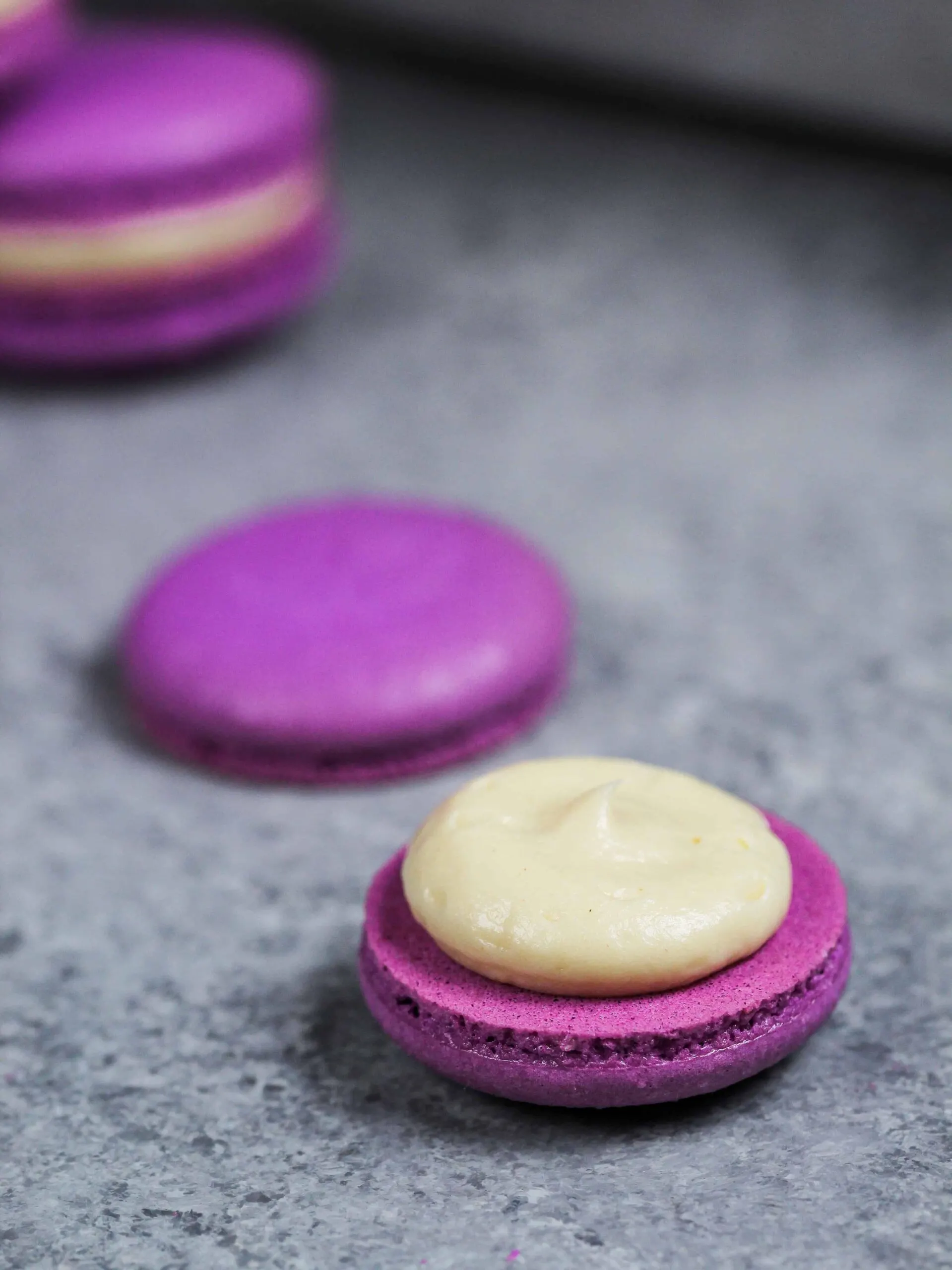
I have a big sweet tooth, so I usually prefer using milk or white chocolate ganache, or American buttercream.
If you don’t want your macarons to be super sweet, I recommend filling them with my dark chocolate ganache, hybrid buttercream, or Swiss meringue frosting.
You can also pipe a frosting or ganache ring on your macarons and fill it with jam or other fillings to create unique flavors.
Recipe Yield
This recipe makes about 48 macaron shells, which can be used to make 24 macarons.
You can double this recipe to make more macarons if needed.
The yield and bake time will also vary based on the size of the macarons you pipe. I pipe my shells with a diameter of about 1 1/2 inches.
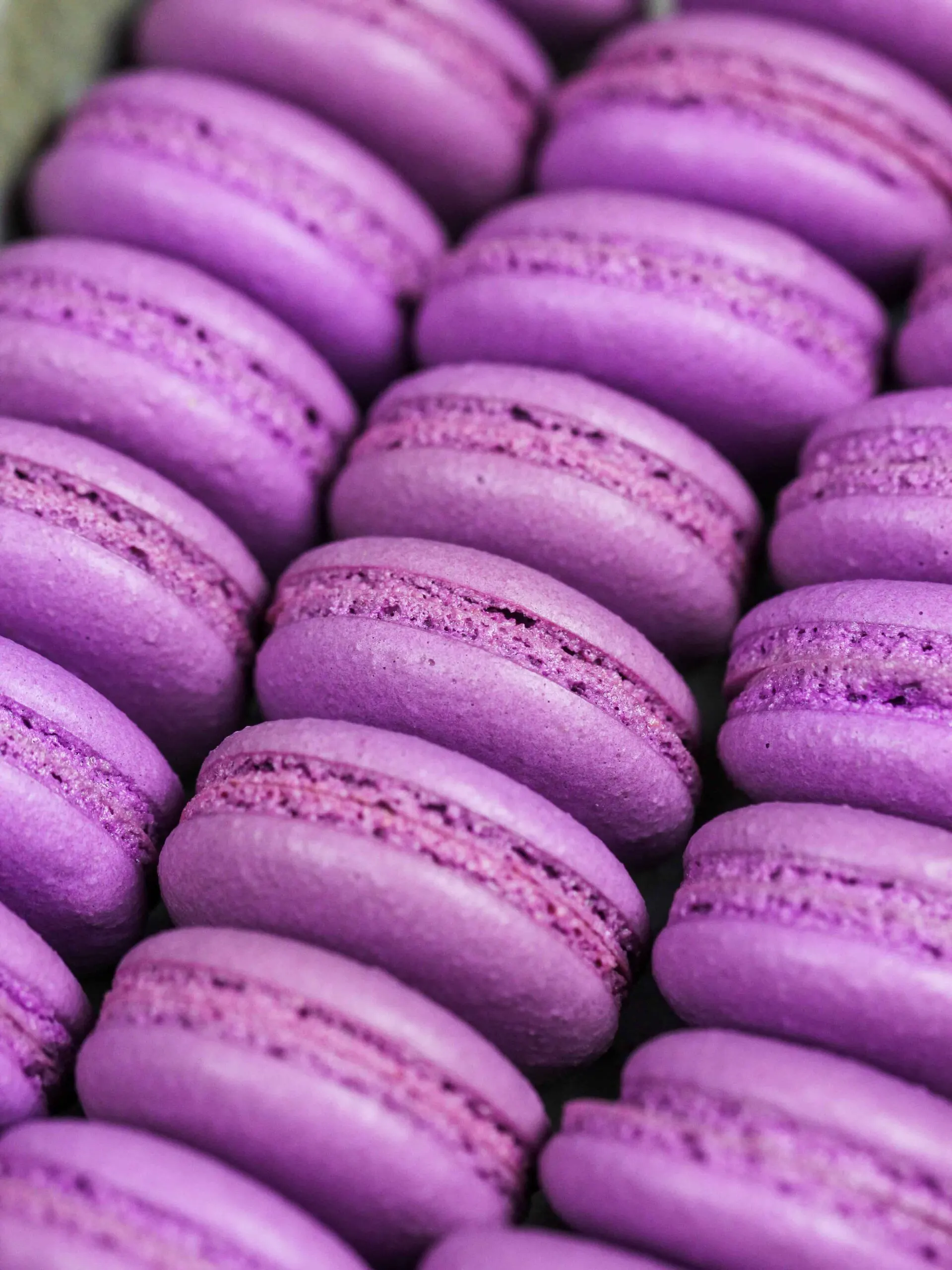
Tips for Making the Best French Macarons
- Carefully read through the directions before making these macarons. There are quite a few steps and it’s good to know your game plan before you start.
- Wipe your mixing bowl and whisk with lemon juice or vinegar to remove any traces of grease before making your meringue. It will help your egg whites whip up better.
- Separate your own eggs and age them if possible. Do not use egg whites from a carton.
- Measure your ingredients in grams with a kitchen scale. You really need to be precise with this recipe. Your macarons will turn out best if the ingredients are weighed.
- Use a macaron mat or print out a template to help you pipe consistently sized macarons.
- Pipe a small number of macarons on a few sheets to test your oven for hot spots and see if it bakes accurately. This way you won’t waste a whole tray of macs if your oven runs hot or cold.
- Let your baked and filled macarons mature! Letting them rest overnight while they are filled softens them (in a good way) and allows the flavors to develop.
- If your first batch of macarons doesn’t turn out, please check out the troubleshooting section above for help!
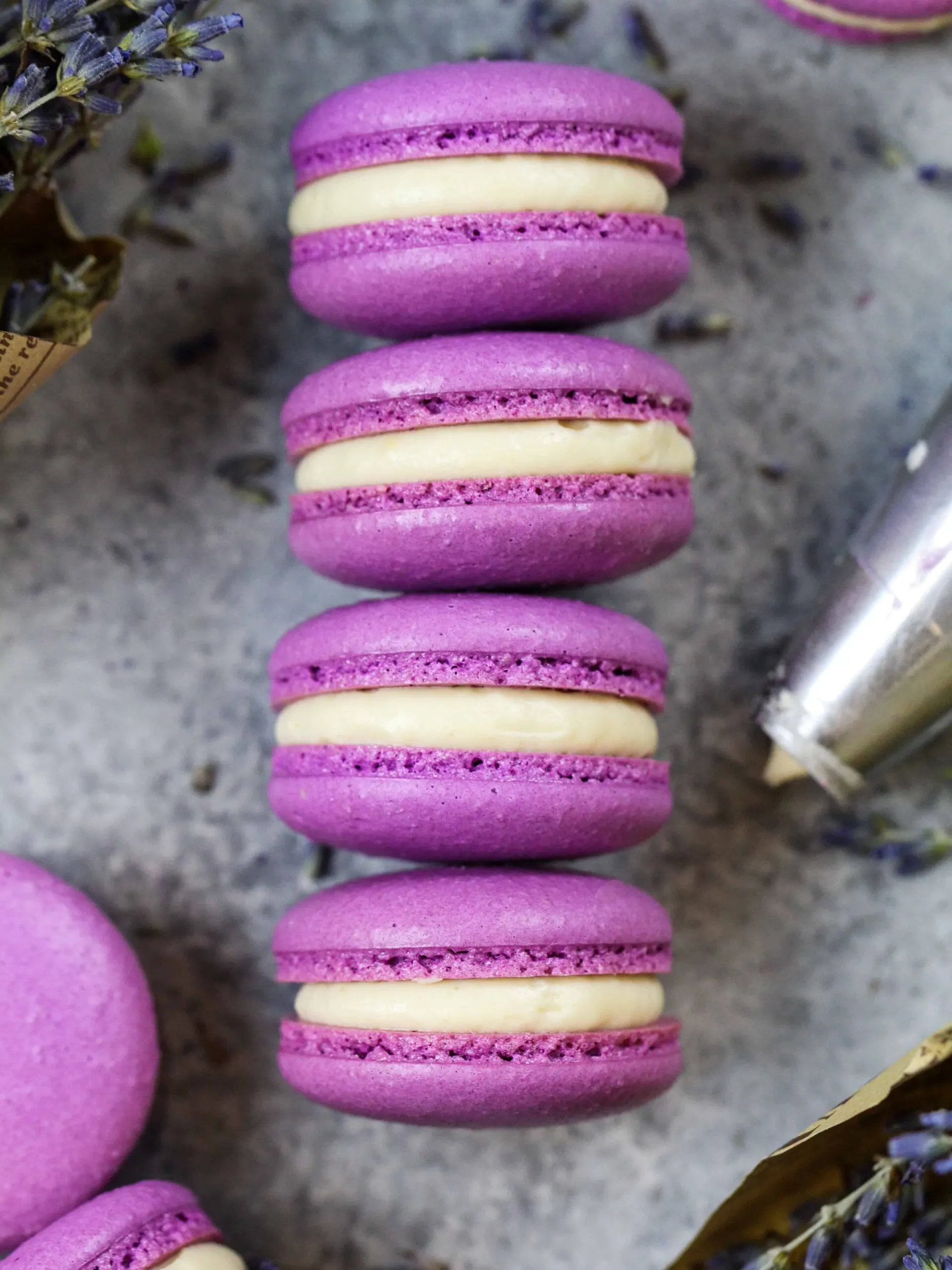
Making These French Macarons in Advance & Storage Tips
- French macarons need to mature for a few hours or overnight in the fridge before being eaten. This gives them time to develop the best texture and taste.
- Store filled macarons at room temperature for up to 2 days in an airtight container.
- Refrigerate filled macarons for up to 5 days in an airtight container.
- Freeze filled macarons for up to a month in an airtight container.
- Unfilled macaron shells can be frozen for up to a month in an airtight container.
- Make your filling ahead of time too or save any leftover filling! Store in an airtight container in the fridge for up to a week or in the freezer for up to a month.
Let Me Know What You Think!
If you try this recipe for French macarons, I’d love to hear what you think of it! Please leave a rating and comment below.
And don’t forget to tag me @chelsweets and use #chelsweets on social media so that I can see your amazing creations!
Other Recipes You Might Like:
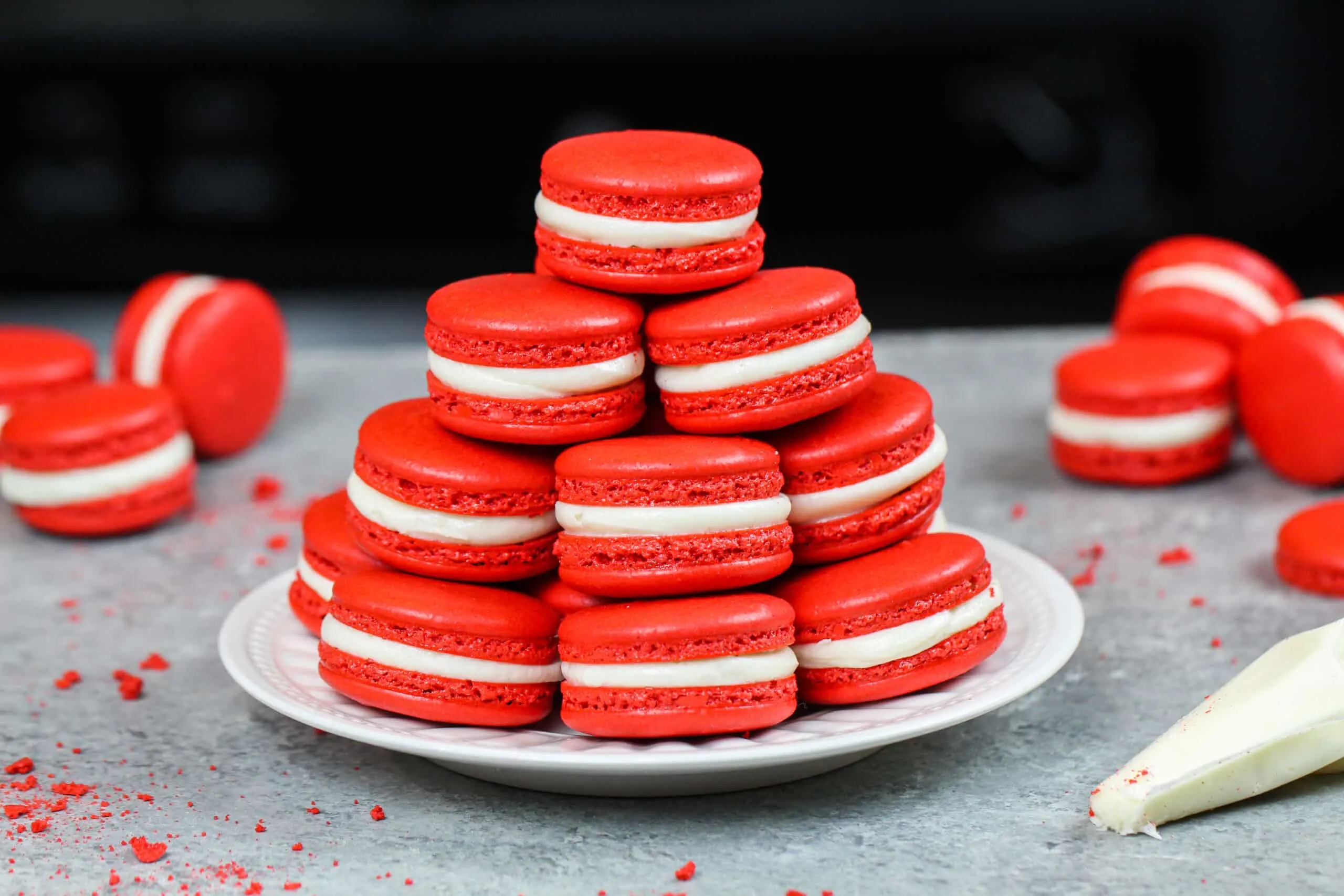

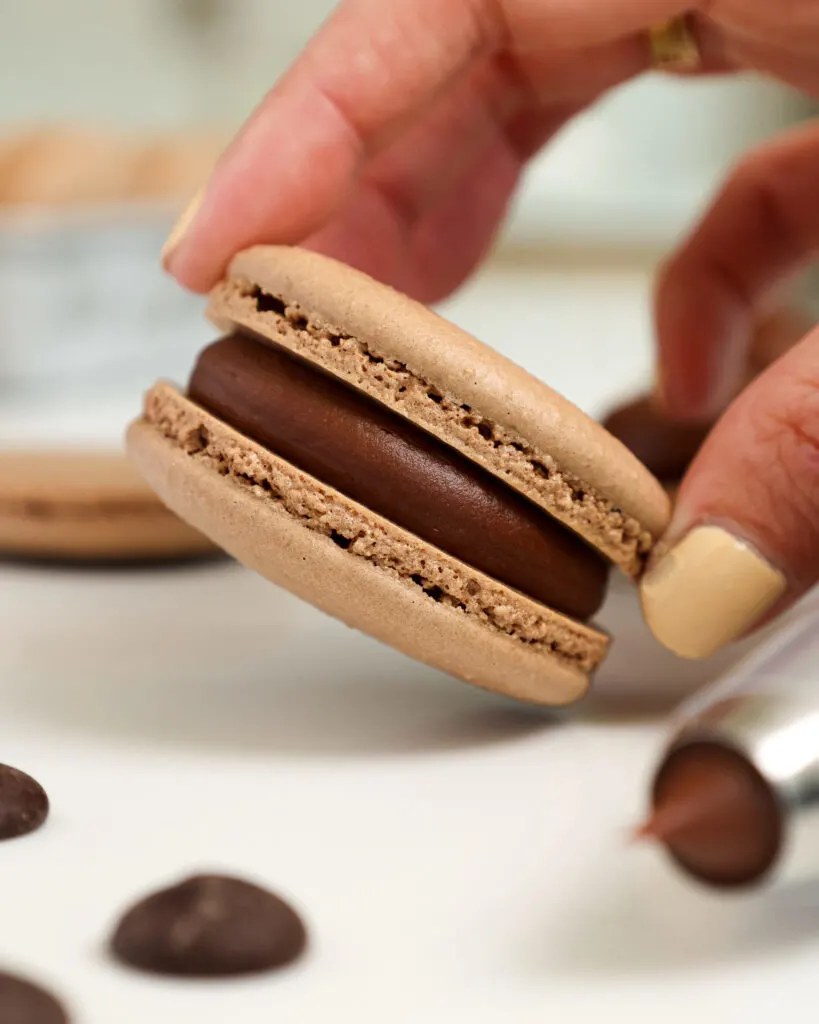
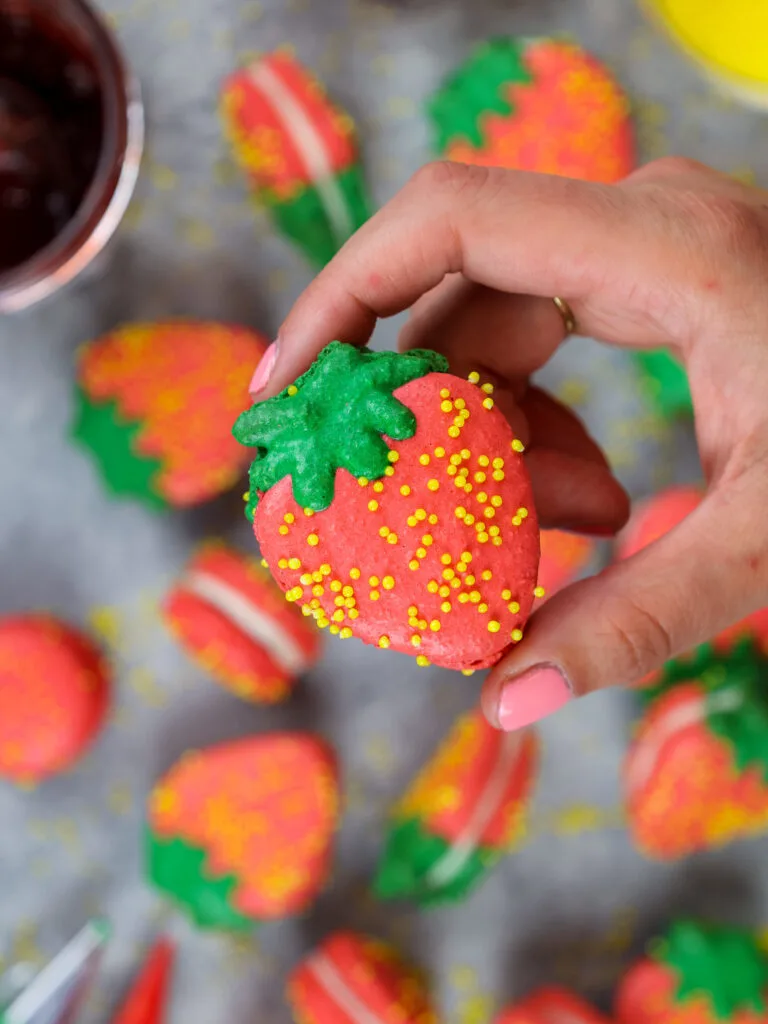
French Macarons
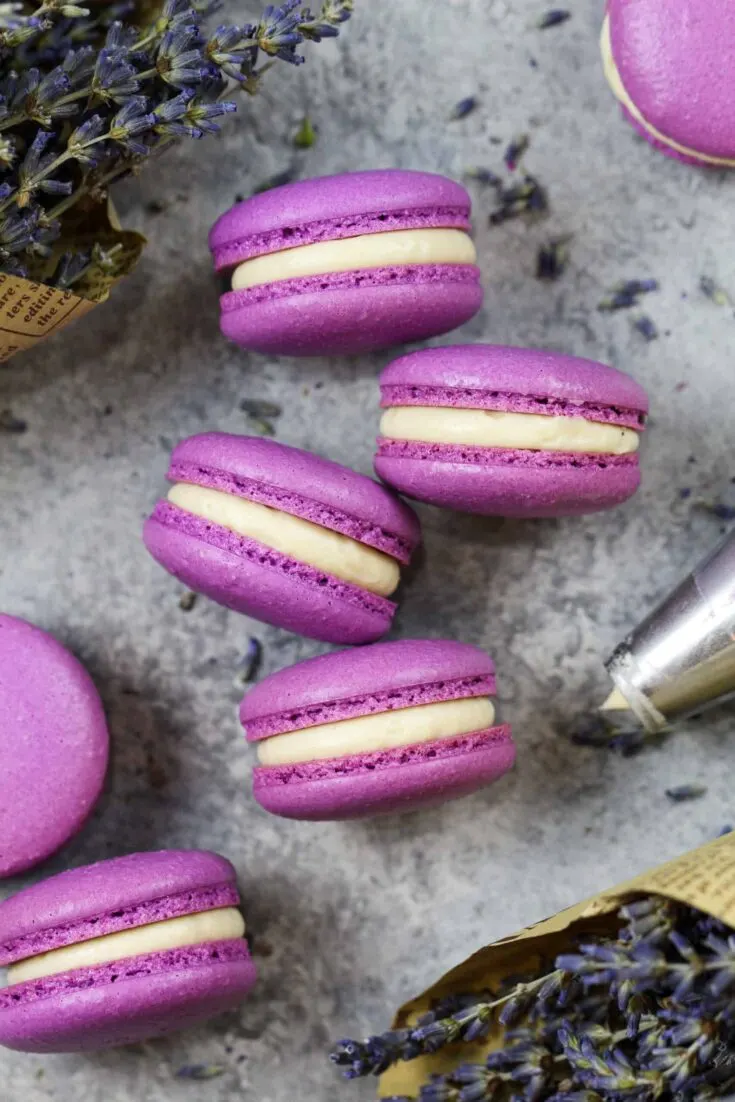
Learn how to make perfect French macarons! My step-by-step tutorial & detailed recipe will help you master these delicious delicacies.
Ingredients
French Macarons
- 110g aged egg whites
- 1/4 tsp cream of tartar - optional
- 110g granulated sugar (1/2 cup + 2 tsp)
- 140g superfine almond flour - blanched (1 1/2 cups)
- 125g powdered sugar (1 cup)
- gel food coloring - optional
American Buttercream Frosting
- 56g unsalted butter, room temperature (1/4 cup)
- 4ml vanilla extract or vanilla bean paste (1 tsp)
- 1g salt (1/8 tsp)
- 125g powdered sugar (1 cup)
- 10ml heavy cream (2 tsp)
Equipment
Instructions
French Macarons (adapted from Laduree Sucre)
- Line two large baking sheets with parchment paper or silicon mats. Set aside.
- Pour 110g of aged egg whites into the bowl of a stand mixer with a whisk and mix on a medium speed until the surface of the egg whites is covered in small bubbles. Add 1/4 tsp cream of tartar and continue to mix until it reaches the soft peak stage and leaves visible tracks.
- Gradually mix 110g of granulated sugar into the egg whites over a few minutes while mixing on a medium-low speed. Increase the mixing speed to a medium-high speed (6 on a KitchenAid). Keep mixing until stiff, glossy peaks form.
- Sift 140g of superfine almond flour and 125g of powdered sugar into the meringue. Use a rubber spatula to break up any big clumps and press them through the sieve.
- Add in a squirt of gel food coloring if desired. Then fold the ingredients together with a rubber spatula. Use a circular motion that sweeps around the edge of the bowl and then pulls through the bottom of the bowl to make sure everything is getting mixed together. Don't forget to scrape off the inside of the spatula intermittently. Sometimes meringue can get stuck there and not get mixed in properly.
- Fold the batter until a thick ribbon of batter runs off the spatula when it's lifted. You should be able to draw a couple of figure 8s with the batter running off your spatula in a continuous stream when it's the right consistency. If the stream of batter breaks before you're able to do this, you may need to stir it a bit more.
- Pour the batter into a large piping bag fit with a medium-sized round piping tip and pipe 1 1/2-inch rounds on the prepared baking sheets. Space them about 1 inch apart.
- Bang the pans firmly on the counter a few times to release air bubbles, then pop any remaining air bubbles that come to the surface with a toothpick.
- Let the macarons rest for 30 minutes, or until they develop a skin. The macarons should look matte once the skin has formed. While the macarons rest, preheat the oven to 320 F / 160 C.
- Bake one tray of macarons at a time on the middle rack of your oven for 18-21 minutes and rotate the pan halfway through to help the macarons bake evenly. Bake time can vary based on the size of your shells, so if you pipe them smaller than 1 1/2 inches, they may be done a few minutes earlier.
- Remove the macaron shells from the oven and let them cool fully on the pan (about 30 minutes), then gently peel them off the Silpat mat. If they're properly baked, they should peel off the mat cleanly and have a shiny bottom.
American Buttercream Frosting
- While the macaron shells bake and cool, make the filling for the macarons.
- Beat 56g of room-temperature butter on a medium speed for a minute with a whisk attachment until it becomes lighter in color and smooth.
- Mix in 4ml vanilla extract and 1g salt on a low speed. Slowly mix 125g of powdered sugar and 10g of heavy cream on a low speed.
- Continue to mix on low for a couple of minutes until the ingredients are fully incorporated and the desired consistency is reached. If the frosting is too thick, add in additional heavy cream or milk (1 tsp at a time). If the frosting is too thin, add more powdered sugar (1 Tbsp at a time).
- Place in a piping bag with a small round tip, and set aside.
Assembling These French Macarons
- Pipe a small dollop of frosting or filling of your choice on the center of one macaron shell and top with a second shell to create a sandwich.
- Place the finished macarons in an airtight container and chill in the fridge overnight, then enjoy!
Notes
Recipe Yield:
This recipe makes about 48 small macaron shells, which can be used to make 24 macarons. You can double this recipe to make more macarons if needed.
The yield and bake time can vary based on how large you pipe your shells. I piped these shells with a diameter of about 1 1/2 inches, so they're about the size of a standard macaron.
Tips for Making the Best French Macarons
- Measure your ingredients in grams with a kitchen scale! You really need to be precise with this recipe. Your macarons will turn out best if the ingredients are weighed.
- Separate your eggs and age them if possible! Do not use egg whites from a carton.
- Use gel food coloring if you want to color your macarons. If you try to use liquid food coloring it can throw off the consistency of the batter.
- Carefully read through the directions before making these macarons. There are quite a few steps and it's good to know your game plan before you start!
- Use a macaron mat or print out a template to help you pipe consistently sized macarons.
- FIRMLY bang your pans on your counter after piping your macarons. This helps release any air bubbles that may be trapped and prevent cracked or hollow shells.
- Rest the macaron shells for 30 minutes before they're baked to allow them to develop a skin.
- Pipe a small number of macarons on a mat to test your oven for hot spots and see if it bakes accurately. This way you won't waste a whole tray of macs if your oven runs hot or cold.
- Let your macarons mature in the fridge overnight! Letting them rest overnight while they are filled softens them (in a good way) and allows the flavors to develop.
- If your first batch of macarons doesn't turn out, please check out the troubleshooting section above for help!
Making These French Macarons in Advance & Storage Tips
- French macarons need to mature overnight (or ideally 24 hours) in the fridge before being eaten! They taste best 24 hours after being made.
- Macarons can be stored at room temperature for up to 2 days in an airtight container.
- Macarons can be refrigerated for up to 5 days in an airtight container.
- Filled macarons can be frozen for up to a month, but the length can vary based on the filling.
- Unfilled macaron shells can be frozen for up to a month in an airtight container.
- Your filling can be made ahead of time too or save any leftover filling! Store in an airtight container in the fridge for up to a week or in the freezer for up to a month.
Nutrition Information
Yield
24Serving Size
1Amount Per Serving Calories 107Total Fat 5gSaturated Fat 2gTrans Fat 0gUnsaturated Fat 3gCholesterol 13mgSodium 20mgCarbohydrates 16gFiber 1gSugar 15gProtein 1g

12 Days of Christmas Cookies- Homemade Holiday Cookies
Friday 15th of December 2023
[…] macaron recipe will leave you with perfect chewy shells (if you’ve never made them before, read my how-to blog), and the gingerbread buttercream that they’re filled with is spiced to […]
Pumpkin Macarons with Spiced Buttercream & Pumpkin Pie Filling
Tuesday 3rd of October 2023
[…] are a few different ways macarons are made. French macarons are considered easier to make while the Italian and Swiss methods use a few more steps but are more […]
Kelsey
Tuesday 26th of September 2023
I have been making macarons for years and decided to try this recipe because the cake/frosting recipes here have never failed me (I love them!). Unfortunately the THREE times I tried this recipe, they all ended up cracked. I did all of the things I normally do, so nothing was missing in the process nor was humidity a factor. I don't understand what's going on but sad to say this one just didn't translate well for me.
Chelsweets
Sunday 1st of October 2023
I'm so sorry to hear that Kelsey!!
When you've made macarons in the past, were they French macarons? I only ask because Swiss or Italian macaron batter has a slightly thicker consistency than French macarons, and maybe if you're used to that then the batter for these French macarons might have been slightly undermixed?
My first thought whenever I head cracked macarons is that the batter that the batter might be slightly undermixed, or that the meringue in a little bit overmixed?? Macarons are challenging because it can be so many different things (I even have a whole post on it!! https://chelsweets.com/cracked-macarons/)
I wish we could share pictures on here because that would help me figure out what might have happened. Did you make any adjustments between the three batches you made? Like did you try to change the oven temperature at all, or mix the batter a different amount? Hopefully we'll be able to figure out what happened together!
Pistachio Macarons: Step-By-Step Recipe w/ Video
Sunday 9th of July 2023
[…] are a few different ways macarons are made. French macarons are considered easier to make while the Italian and Swiss methods use a few more steps but are more […]
Pistachio Ganache: Easy, 4-Ingredient Recipe
Sunday 9th of July 2023
[…] French Macarons […]